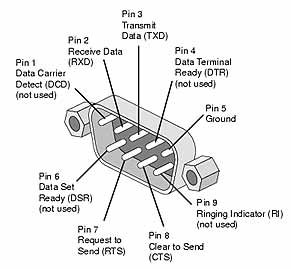Have used 2 methods.
1. PICkit 2 Development Programmer/Debugger. See their
instructions in the program or website.
2. Serial port. I used HyperTerminal to read text from the
serial port & display on screen, but other programs can do that
too. Make sure the baud rate is 9600 bits / sec, just like in
the PIC code: #use rs232(baud=9600, xmit=PIN_C6, invert)

Serial Port Steps
(if using HyperTerminal)
1. Wire serial port pin
2 to pin TX (same as RC6) on the PIC.
2. Wire serial port pin 5 to ground.
3. Connect serial port to computer. Use a serial-USB adapter if
computer has no serial port.
4. Open HyperTerminal.
5. Enter any name, select the icon that says “MCI”
6. Connect using COM5/COM13/etc. If there are multiple COMs:
pull out the USB, reopen HyperTerminal, & see which COM has
vanished. That’s the one you want.
7. Set bits per second = 9600.
8. HyperTerminal is set up. It will keep reading input until you
close the program.
9. Load code onto PIC
10. Hit switch to turn on PIC
Code
#include <16F877A.h>
#device adc=8
#FUSES NOWDT //No Watch Dog Timer
#FUSES HS //Highspeed Osc > 4mhz
#FUSES PUT //Power Up Timer
#FUSES NOPROTECT //Code not protected from reading
#FUSES NODEBUG //No Debug mode for ICD
#FUSES NOBROWNOUT //No brownout reset
#FUSES NOLVP //No low voltage prgming, B3(PIC16) or B5(PIC18)
used for I/O
#FUSES NOCPD //No EE protection
#use delay(clock=20000000) // Sets crystal oscillator at 20
megahertz
#use rs232(baud=9600, xmit=PIN_C6, invert) //Sets up serial port
output pin & baud rate
void main(){
int x = 0;
while(true){
x = x + 1;
//This is an ordinary C
language printf statement that will display on the screen of
your PC.
//But, you need to open a
special program to read serial port input, like HyperTerminal.
//Make sure the baud rate
of the program matches this code’s baud rate (9600 bits /
second)
printf("hello, x=%d\r\n",x);
//send this text to serial port
delay_ms(100); //wait 100
milliseconds
}
} |